|
|
|
|
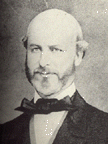
General Stevens was born in Norwich, Connecticut on August 14, 1821. He was involved in banking until the beginning of the War. He designed the ironclad battery that served in Charleston Harbor. Stevens was an inventor and a man of many talents. He was wounded at First Manassas while serving with General Barnard Bee and States Rights Gist. Stevens was elected Colonel of the Twenty-Fourth Regiment, which he commanded at Secessionville. The Twenty-Fourth went to Mississippi with Stevens in command and he was wounded at Chickamauga. He was promoted to Brigadier in January of 1864 and transferred to another brigade within Walker's Division during the battles around Atlanta. He was wounded in the Battle of Peachtree Creek on the 20th of July and died on the 25th. He is buried in Pendleton, South Carolina. He was the brother of Colonel P.F. Stevens of the Holcombe Legion. |
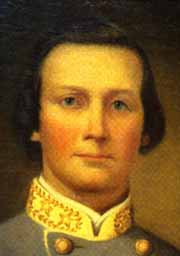 General States Rights Gist Collection of the South Carolina Relic Room Columbia, S.C. States Rights Gist was born in Union District on September 3, 1831. He attended what later became the University of South Carolina and Harvard. In Union, Gist practiced law and became involved in politics and the militia. He was a brigadier in the militia prior to the war and served as Inspector General of the State of South Carolina after secession. His brother Joseph was also a Brigadier of the militia and was a Major in the Fifteenth South Carolina. His cousin, William Henry Gist, was Governor of the State of South Carolina during the war. Governor Gist's son, William Murena was also major of the Fifteenth and was killed in action at Knoxville. Gist war service began at First Manassas when he assumed command after the death of General Barnard Bee. He was promoted to Brigadier on March 20, 1862 and assigned to service in South Carolina. He took a brigade to Wilmington during the crisis there and then went to Mississippi with the unit that would bear his name. Gist was wounded at Chickamauga and rendered valuable service in the retreat from Missionary Ridge. Wounded again in the Atlanta campaign, his brigade was attached to John C. Brown's Division for the invasion of Tennessee. He was killed leading his troops forward after having been wounded at Franklin. He is buried at Trinity Episcopal with his friend, Bishop/General Ellison Capers. Grave of |
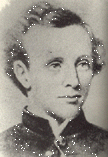
General Ellison Capers Ellison Capers was born in Charleston, South Carolina on October 14, 1837. One of four graduates of The Citadel to become General Officers in the War Between the States, Capers was elected a Major of the First South Carolina Rifles in 1861. The unit is often confused with Orr's Rifles. He was present with the cadets from The Citadel during all the actions around Charleston Harbor. He then helped to recruit the Twenty-fourth South Carolina and was elected Lt. Colonel of that unit. He was distinguished for his service at Secessionville. A man of devout faith, Capers was the J.L. Chamberlain of the south. Trusting entirely to God for his safety, he was wounded at Wright's Farm, Chickamaugha, Atlanta, and Franklin. Following the death of General Gist at Franklin, Capers was promoted to brigade command on March 1, 1865. After the war, he became an Episcopal minister and eventually became a Bishop in the Episcopal Church. He was Chaplain General of the United Confederate Veterans and served at the University of the South. He wrote the South Carolina Volume of the Confederate Military History and other military and religious works. He is buried at Trinity Church in Columbia, South Carolina. Capers died on April 22, 1908. He is virtually a forgotten man today, waiting in the wings for history to once again discover him. Grave of The Citadel and The Sixteenth |
|
General Ellison Capers Report on Franklin |
|
The Gist Brigade was formed when units were moved from service in Charleston Harbor to Mississippi. From its inception, the Gist Brigade served in Walker's Division, under the command of W.H.T. Walker until his death in the Battle of Atlanta. Some of the units had formed a very large brigade under Gist earlier. This earlier move had taken the units involved from the South Carolina coast to the defense of Wilmington, North Carolina. The Brigade would produce three Confederate Generals but only two would actually command the Gist Brigade. All three men would come from the Twenty-fourth South Carolina and would serve as officers on the coast, under Johnston in 1863, and finally in the Army of Tennessee. His father named General States Rights Gist so that he would not forget his politics. He would die in front of the breastworks at Franklin after having been wounded and continuing on, leading his South Carolina Brigade. His manservant would bring his body home, finding the concept of family far more compelling than the concept of freedom. Perhaps in a way, we all sacrifice freedom for family and this is the most admirable of human emotions and the most worthy of endeavors.
When these most worthy men and women were freed, they were given the opportunity to choose a new name for a new beginning. It is no accident that most would choose to associate themselves and the children they loved with the family they had so recently served. This simple but profound statement of shared names across racial lines says more about how both black and white saw their relationship in the antebellum south than I ever can. Family in the South extends far beyond race. In these things I speak only for myself and the people I have known, cared for, and loved in this region. It is my hope that we can and will continue to find a new tomorrow together. It is my greatest desire that we recognize and respect the shared community that is our greatest legacy. Thank you for stopping here, please enjoy and comment about what you find.
|
|
See Cisco, Walter Brian, States Rights Gist, for additional information. |
| Cooper, William | Major | Surgeon | 1863 |
|---|---|---|---|
| Dearing, A.J. | Major | Commissary | 1863 |
| Green, John S. | Major | Quartermaster | 1863 |
| McKinzie, W.G. | Major | Surgeon | 1864 |
| Smith, B.B. | Major | Brigade Inspector | 1863 |
| " | " | Assistant Adjutant General | 1864 |
| " | Colonel | Commander Consolidated 16th and 24th | 1865 |
| Smith, R.B. | Major | Acting Assistant Adjutant General | 1863 |
| Bowie, J.A. | Captain | Brigade Commissary | . |
| Dunovant, John | Captain | Aide-de-Camp | 1863 |
| Garden, Henry DeSaussure | Captain | Assistant Inspector General Letter from | 1864 |
| Gist, James D. | Captain | Aide-de Camp | 1862 |
| " | " | Died of Illness, Morton, Mississippi | 1863 |
| Glover, Joseph | Captain | Aide-de-Camp | 1863 |
| King, Mallory P. | Captain | Assistant Adjutant General | 1862 |
| Nance, William F. | Captain | Assistant Adjutant General | 1862 |
| Tracy, Carlos | Captain | Aide-de-Camp | 1862 |
| Walker, Joseph | Captain | Assistant Adjutant General | 1862 |
| Habersham, Joseph Clay | First Lieutenant | Aide-de-Camp | 1863 |
| " | " | Killed In Action, Battle of Atlanta | 1864 |
| Butler, Lee M. | Second Lieutenant | Acting Ordnance Officer | 1862 |
| " | " | Promoted to First Lieutenant | 1863 |
| Hunt, J.M. | Second Lieutenant | Acting Ordnance Officer | 1863 |
| " | " | Promoted First Lieutenant | 1864 |
| Trenholm, Frank H. | Second Lieutenant | Aide-de-Camp | 1864 |
|
|
|
Units and Organization 16th Regiment South Carolina Volunteer Infantry Greenville County Col. James McCullough 24th Regiment South Carolina Volunteer Infantry Colonel Clement Stevens Colonel Ellison Capers Marion, Colleton, and Edgefield County 46th Regiment Georgia Volunteer Infantry Upson, Schley, Harris, Muscogge, Chattahoochee, Webster, Marion and Talbot Counties Colonel Peyton H. Colquitt Colonel Samuel J.C. Dunlop 8th Battalion Georgia Volunteer Infantry Adairsville, Savannah, Thornbrough and Gordon County Lt. Colonel Asahel Littlefield Lt. Colonel Leroy Napier, Jr. Lt. Colonel J.T. Reid Lt. Colonel Zachariah L. Waters Ferguson's Battery Captain T.B. Ferguson Captain Rene Beauregard Units of the Confederate Army, Joseph Crute, Jr., ISBN#0-942211-53-7 July 30, 1863 Ė Mississippi Walkerís Division - Major General W.H.T. Walker Gistís Brigade - Brig. Gen. S.R. Gist Forty-sixth Georgia - Colonel Peyton H. Colquitt Sixteenth South Carolina - Colonel James McCullough Twenty-fourth South Carolina - Colonel Clement H. Stevens Eighth Georgia Battalion -Captain Z.L. Waters South Carolina Battery - Captain T.B. Ferguson April 30, 1864 - Georgia (Atlanta Campaign) Hardeeís Corps - Lieutenant General William J. Hardee Walkerís Division - Major General William H.T. Walker Gistís Brigade - Brig. Gen. S.R. Gist Forty-sixth Georgia - Major Samuel J.C. Dunlop Sixteenth South Carolina - Colonel James McCullough Twenty-fourth South Carolina - Colonel Ellison Capers Eighth Georgia Battalion - Lieut. Col. Zachariah L. Waters June 30, 1864 Walkerís Division - Major General William H.T. Walker Gistís Brigade - Brig. Gen. S.R. Gist Forty-sixth Georgia - Captain Eleazar Taylor Sixteenth South Carolina - Colonel James McCullough Twenty-fourth South Carolina -Colonel Ellison Capers Eighth Georgia Battalion - Lieut. Col. Zachariah L. Waters July 10, 1864 Walkerís Division - Major General William H.T. Walker Gistís Brigade - Brig. Gen. S.R. Gist Forty-sixth Georgia -Major Samuel J.C. Dunlop Sixteenth South Carolina - Colonel James McCullough Twenty-fourth South Carolina - Colonel Ellison Capers Eighth Georgia Battalion - Col. Zachariah L. Watters Second Georgia Sharpshooter Battalion - Major Richard H. Whiteley Fifth Mississippi - Lieut. Colonel John B. Herring* Eighth Mississippi - Colonel John C. Wilkinson* *Temporarily attached from Jacksonís brigade, which was broken up. July 31, 1864 Cheathamís Division - Brig. Gen. George Maney Gistís Brigade* Forty-sixth Georgia - Captain Eleazar Taylor Sixty-fifth Georgia - Captain William G. Foster Sixteenth South Carolina - Captain John W. Boling Twenty-fourth South Carolina - Lieut. Col. Jesse S. Jones Eighth Georgia Battalion - Lieut. Col. Zachariah L. Watters Second Georgia Battalion Sharpshooters - Major Richard H. Whiteley *Transferred from Walkerís Brigade July 24. The Fifth and Eighth Mississippi From Jacksonís brigade, transferred to Lowreyís brigade. Jacksonís brigade, Walkerís division, reported in roster of July 10 as broken up the 5th and 47th Georgia sent to Savannah, Ga. and the 2nd Georgia Battalion Sharpshooters, the 65th Georgia, and the 5th and 6th Mississippi regiments being than attached to Gistís brigade. Walkerís division was broken up July 24 and brigades assigned to other divisions of Hardeeís Corp with the 5th and 8th Mississippi leaving Gistís Brigade at that time. August 31, 1864 Cheathamís Division - Brig Gen. George Maney Gistís Brigade - Ellison Capers Forty-sixth Georgia - Captain W.A. Davie Sixty-fifth Georgia - Captain William G. Foster Sixteenth South Carolina- Captain John W. Boling Twenty-fourth South Carolina - Lieut. Colonel Jesse S. Jones Eighth Georgia Battalion - Lieut. Colonel Zachariah L. Watters Second Battalion Georgia Sharpshooters - Major Richard H. Whitely December 10, 1864 - Tennessee Campaign 1864, After Franklin Cheathamís Corp - B.F. Cheatham Gistís Brigade - Lt. Col. Zachariah L. Waters 16th South Carolina - Captain John W. Boling 24th South Carolina - Captain W.C. Griffin 46th Georgia Regiment - Captain Malcolm Gillis 65th and 8th Georgia Battalion - Captain W.W. Grant 2nd Battalion Georgia Sharpshooters - Captain W.H. Brown |
|
|
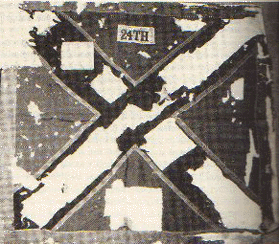 |
|
The Struggles of the Gallant 24th Regiment, South Carolina Volunteers, Infantry, 1861-65 Eugene W. Jones Jr. "On Monday, April 20, 1863, General Beauregard reviewed two brigades, commanded by Gist on James Island. General T.L. Clingman commanded one of the brigades and Colonel Stevens the other. Capers commanded the 24th. Afterwards, Beauregard presented each of the regiments with a battle flag. The flag was the Starry Cross or the St. Andrew's Cross, also known as "The Beauregard Flag." The 24th would carry these colors until the end of the war." Enlisted for the War, Jones The men at Greensboro, who feared they would have to surrender them, cut up the colors of the 24th. They reside today in the Confederate Relic Room with the colors of the Sixteenth. Col. B.B. Smith hid both flags at the end of the war and Smith returned the Twenty-Fourth Colors to the vets in the late 1870's. These colors both carry identical numerical designations and the square cut out at the bottom of the 24th would have supported the So. Ca. designation. Both are Charleston Depot colors and neither carries any mark that would show them having been captured. |
|
Sixteenth S.C.V. 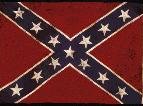
|